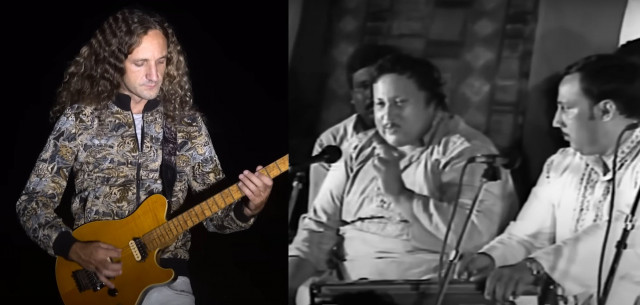NFAK birthday special: This rock rendition of 'Saanson Ki Maala' should be on your playlist
Grammy Award-winning guitar player André Antunes gives 'Saaanson Ki Maala' a rocky twist

Today marks the birthday of sub-continent’s arguably most famous musician, Ustad Nusrat Fateh Ali Khan (NFAK). The maestro was born on October 13, 1948. Not a slave for an introduction, Nusrat was well known for his singing prowess. Touted as the best Qawwal to this day by New York Times, he has been dubbed the "Shahenshah-e-Qawwali" (the King of Qawwali). While there have been many renditions of Nusrat’s masterpieces, a recent metal take on his famous ghazal has made quite a noise on social media.
On September 28, 2022, the renowned Portugal musician André Antunes released a video on YouTube, leading to an incredible metal rendition of NFAK's Saanson Ki Maala. The music video bagged up to 319,296 views, with an array of people relishing the well-attempted remake of the song.
One of Meera Bai's most famous songs is Sanson Ki Mala Pe, which translates to "On the rosary of breath." Bai was a mystic poet who lived in the 16th century. Her devotion to Krishna is spoken about in the lyrics Sanson Ki Mala Pe Simru Main, Pi Ka Naam.
Her poetry is characterised by total surrender to God. Meera Bai composed this bhajan for her Lord Krishna, the object of her undying devotion. Later, it was modernly popularised by several musicians, most notably the famous late musician.
When Nusrat first visited India in 1979, he was asked by Raj Kapoor to perform at the wedding of his son, Rishi Kapoor. Qawwali performances, Music reality shows and religious gatherings continue to use the song.
Portugal's André is a musician, whose tasteful renditions are viral on the internet. Although André has gained widespread recognition for his electric guitar prowess, his creative abilities extend well beyond the realm of the electric guitar. He hears and sees heavy metal and other forms of music in everyday life. His recreation of NFAK's work certainly deserves to hit the top shelf on playlists.
Have something to add to the story? Share it in the comments below.



















COMMENTS
Comments are moderated and generally will be posted if they are on-topic and not abusive.
For more information, please see our Comments FAQ